Cavities on the Outer and Inner Surfaces and Some Appropriate Treatment Directions. Tooth decay is an oral disease that occurs quite commonly in everyone. So how to treat tooth decay inside and outside? Which method effectively helps prevent tooth decay? BeDental’s article below will help you answer all your questions.
What are cavities on the outer and inner surfaces? Signs of recognition?
The inside and outside surfaces of teeth are usually less prone to decay than the chewing surfaces. Because these are two locations with flat surfaces, few crevices and are easy to clean when brushing your teeth. However, in some cases, tooth decay can still attack the inside and outside of the tooth.
Tooth decay not only seriously affects eating and daily activities, but also affects the aesthetics of the face and smile. Because the inside and outside of the teeth will easily be exposed when smiling and talking. Not to mention the problem of tooth decay on the side is also very dangerous if not treated early.
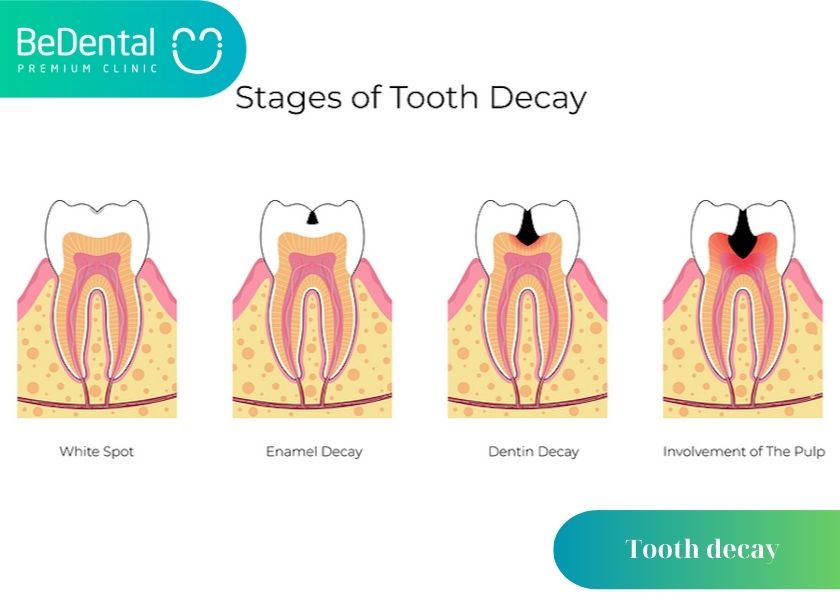
So how to recognize tooth decay on the outside and inside? You can easily recognize it through the following signs:
- The inner and outer surfaces of the teeth show discoloration, brown or black spots.
- Brown or black spots can appear anywhere on the tooth and most affect the tooth neck position. Because the neck of the tooth usually contains a lower concentration of minerals than other parts, cavities are more likely to attack.
- If left severe, the cavity can go deep into the dentin. At this time, the size of the cavity will increase rapidly in both size and depth, surrounded by jagged tooth edges and often black in color.
- Food can get into the cavities, causing pain and sensitivity when eating and drinking. In particular, tooth pain often occurs mainly in the morning, causing patients to not know how to handle painful tooth decay.
- When having tooth decay on the inside or outside, the patient often has bad breath and inflammation of the gum tissue surrounding the teeth.
- External tooth decay will be easier to recognize than inner tooth decay. Most people with internal tooth decay are only discovered when there are signs of extreme pain and are examined and determined by a dentist.
See more: Should be extracted molar tooth decay? Is it painful?
What causes tooth decay?
Tooth decay is caused by many factors, including multiple factors and synergistic causes. You need to learn about the mechanism that causes tooth decay to be able to determine the appropriate treatment plan.
Mechanism of tooth decay
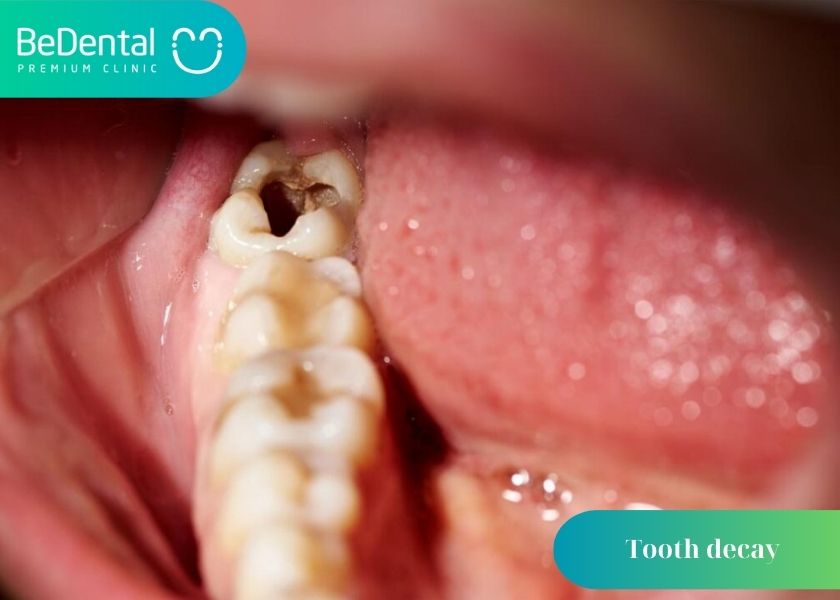
In each person’s oral cavity there are up to 70 billion bacteria, about 200 – 300 different types. Among them, Streptococcus mutans is the leading bacteria that causes tooth decay.
Besides, if you consume too much carbohydrate in starch and sugar, it will cause bacteria to penetrate the plaque, then convert carbohydrates into acids. Acids secreted by bacteria will reduce the pH in the mouth.
If you do not clean plaque and tartar early, bacteria will continuously produce acid and cause the hard tissues of tooth enamel and dentin to dissolve. Over time, hard tissue is lost and cavities form.
Causes and risk factors for tooth decay on the inside and outside of teeth
Based on the mechanism of tooth decay, we can see that the presence of Streptococcus mutans and carbohydrates in food are always the leading causes. However, these two factors are not enough to form tooth decay without the following causes and risk factors:
- Poor oral hygiene habits
Not paying attention to good oral hygiene is the leading cause of a series of oral diseases, including tooth decay. Because not cleaning thoroughly causes leftover food to remain on the tooth surfaces, creating conditions for Streptococcus mutans to grow. At the same time, it accelerates the dissolution of hard tissues in enamel and dentin, thereby forming cavities.
- Reduced salivation
In the oral cavity, saliva plays an extremely important role. Scientific research shows that saliva has the effect of preventing tooth decay thanks to the effect of remineralizing tooth enamel and neutralizing acids from bacteria.
However, if salivation is reduced for a long time, tooth decay will easily occur. Often dry mouth and reduced salivation are due to heavy smoking, advanced age, alcohol abuse, etc.
- Diet contains too much sugar
Carbohydrates in sugar are the favorite source of nutrients for harmful bacteria in the oral cavity. Therefore, adding too much sugar will cause bacteria to thrive and excrete a lot of acid. When the acid is large, it will dissolve the hard tissue in the teeth and cause decay.
- Some other factors
Besides the above causes, tooth decay on the inside and outside is also caused by: enamel hypoplasia, tooth enamel erosion, fluoride deficiency, weakened immune system, congenitally thin tooth enamel,…
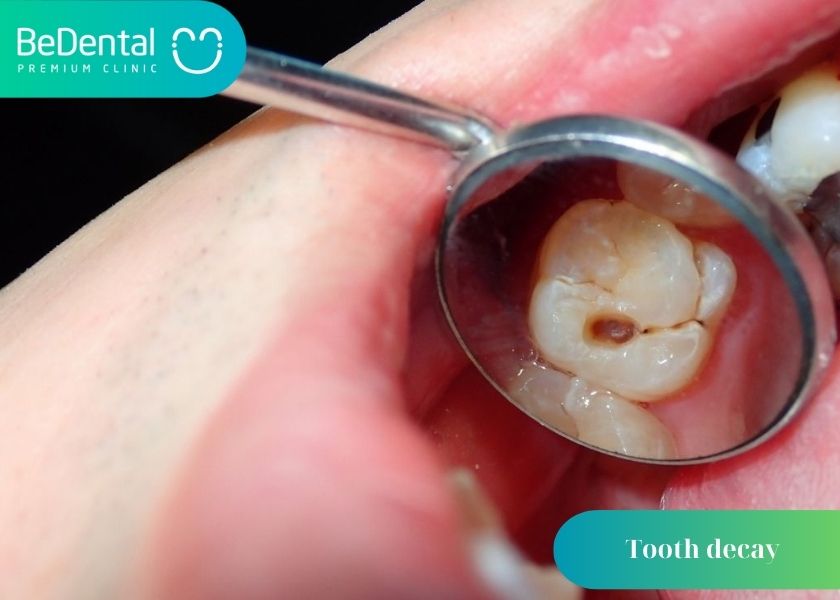
Is tooth decay on the inside or outside dangerous?
Although tooth decay is a common disease, you absolutely should not be subjective. The development process of tooth decay is often slow and prolonged, so you should proactively examine and treat it early to avoid more serious complications.
Usually side tooth decay is mild and not a cause for concern. With early examination and treatment according to the doctor’s regimen, tooth decay on the inside and outside will be improved in a short time.
On the contrary, if you do not intervene early and let tooth decay become severe, it can cause many serious complications such as:
- Cavities on the inside and outside of teeth seriously affect aesthetics, especially for incisors and canines.
- Tooth decay will cause prolonged sensitivity, swelling, and directly affect eating and daily activities.
- Pain caused by tooth decay can flare up at night, affecting sleep and overall health.
- The longer tooth decay lasts, the higher the risk of pulpitis, periodontitis, gingivitis, pulp death, permanent tooth loss, etc.
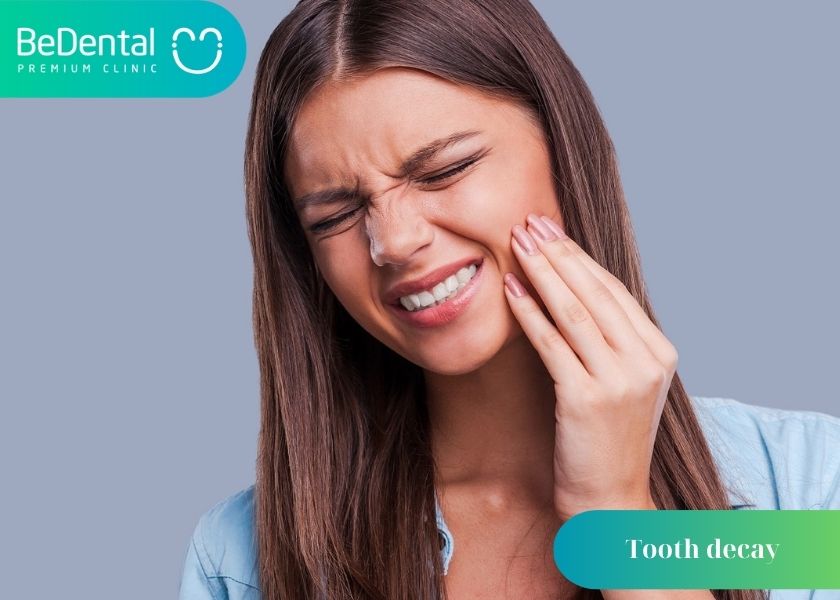
An effective and safe treatment plan for internal and external tooth decay
Treatment options for tooth decay: Tooth decay can be completely treated if detected early and properly intervened. Depending on the level of damage to the tooth, the doctor will create an appropriate treatment regimen. Below are some ways to improve and treat tooth decay on the inside and outside that you should refer to:
Keep your teeth clean and according to medical standards
Teeth that are not properly cleaned are one of the leading causes of tooth decay. Therefore, you need to adjust the way you clean your teeth to treat this disease.
Below is a specialist’s opinion on how to clean your teeth both inside and outside:
- Choose a brush of the appropriate size and prioritize soft, thin bristles. This will help the brushing process be cleaner and not damage the gum tissue. Besides, you need to change your toothbrush every 2-3 months to avoid bacteria accumulation that causes dental disease.
- When brushing your teeth, brush gently vertically, not horizontally. Besides, you should only use moderate force.
- Teeth cleaning requires attention to the inside, outside and chewing surfaces of the teeth. At the same time, pay attention to molars because this is a hidden location and is more difficult to clean than other teeth.
- Brushing your teeth alone is not enough because it will not remove food stuck in the gaps. Therefore, you should use dental floss to remove leftover food and plaque accumulated between teeth.
- Use diluted physiological saline or antiseptic solution to kill harmful bacteria inside the oral cavity. In addition, you can use mouthwash solutions supplemented with fluoride to prevent tooth decay and increase the strength of tooth enamel.
- For young children, you should use a soft cloth to gently wipe the gum tissue and teeth. This method will help clean plaque and leftover food, effectively preventing tooth decay.
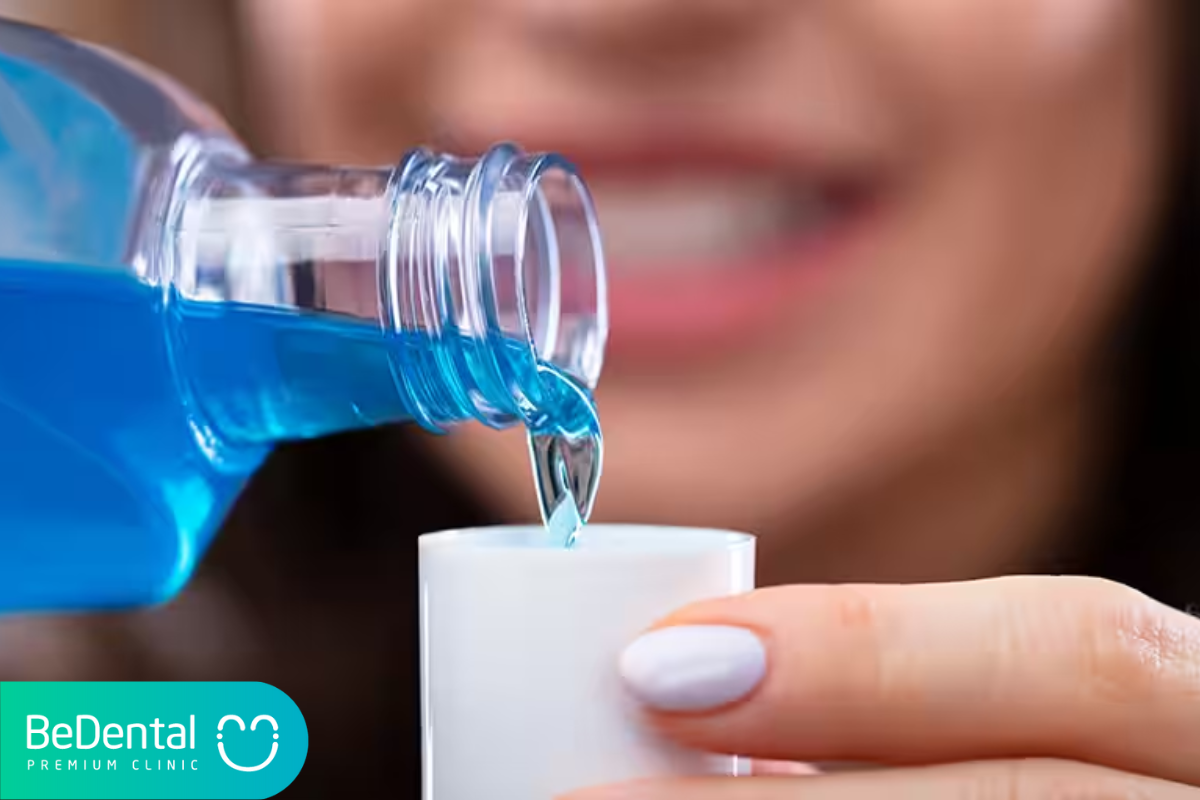
See more: Dentures are smelly and painful- Causes and some solutions
Endodontic treatment of inner and outer tooth decay
Endodontic treatment, also known as root canal treatment, will be indicated in cases of severe internal and external tooth decay and complications of pulpitis. It is known that the dental pulp is an organ located deep inside and is connected to many neighboring organs. If not treated promptly, bacteria can pass through the tooth apex and move to other organs causing infection.
A root canal is performed by exposing the pulp. Then use a machine or hand file to remove the infected pulp. The structure of the dental pulp is very complex, so the doctor must be highly skilled and have many years of experience. You should go to a reputable dental clinic like BeDental to be completely assured about the quality of service. After the root canal, the doctor will disinfect and re-fill.
Get tooth filling
Not every case of tooth decay requires a tooth filling. The doctor will rely on the current state of tooth decay to decide whether or not to fill the tooth.
Dental fillings are a simple dental procedure to fill holes and grooves. For decayed teeth, dental filling is a perfect, safe and effective restoration technique.
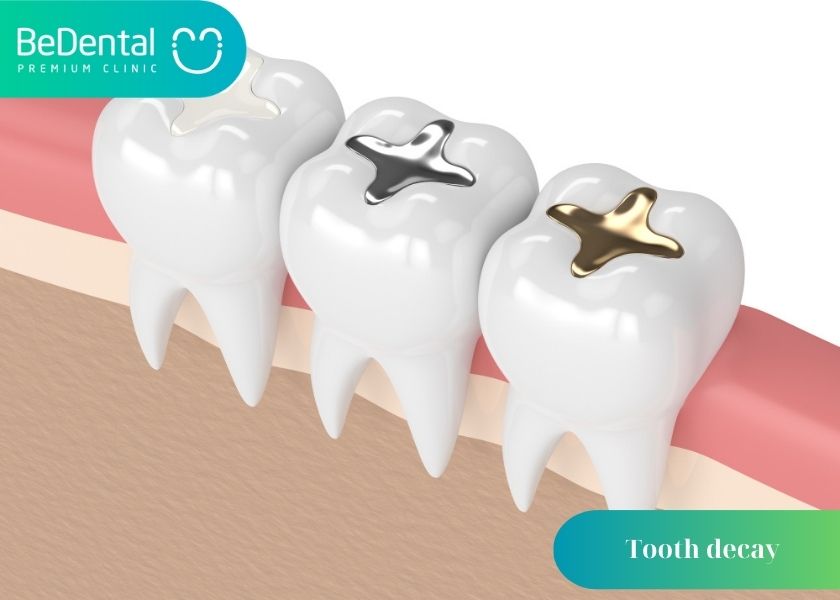
With tooth decay, tooth filling is only performed when dark spots and cavities have formed on the inside and outside of the tooth. To prevent bacteria from continuing to grow, the doctor will scrape off the decayed enamel, disinfect it, and dry it before filling it with specialized materials.
Remove decayed teeth
Most cases of tooth decay can be treated with fillings, root canals, and proper cleaning. However, if the tooth decay is severe and seriously damages the tooth root, the doctor will recommend extraction.
If you have a permanent tooth extracted, you need a suitable restoration plan. Because after a period of tooth loss, the alveolar bone will be destroyed, leading to other complications. Dental implants are the optimal solution to prevent tooth bone loss from occurring.
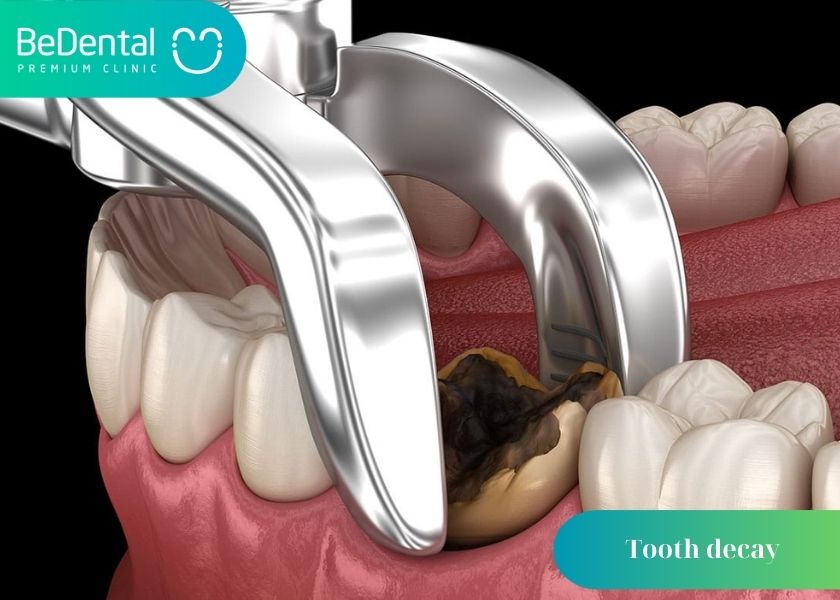
Other supportive measures when suffering from tooth decay
In addition to the medical methods mentioned above, you can apply supportive measures to reduce some of the pain and sensitivity caused by tooth decay on the inside and outside of your teeth. Some methods to improve tooth decay are:
- Soak in warm salt water: Tooth decay on the inside and outside can cause swollen gums and sensitivity when eating and drinking. To relieve this discomfort, you can hydrate with diluted warm salt water.
- Gargle with clove essential oil: With strong antibacterial properties, it will help anesthetize and reduce pain effectively. When your teeth are sensitive for too long, use ¼ teaspoon of clove essential oil mixed with 50ml of warm water to suck and gargle.
- Sucking on fresh ginger: Reducing pain caused by tooth decay at home with fresh ginger is very effective. Besides, sucking on ginger also helps fight inflammation, reduce swelling, kill bacteria and reduce bleeding.
Tell you how to effectively prevent tooth decay
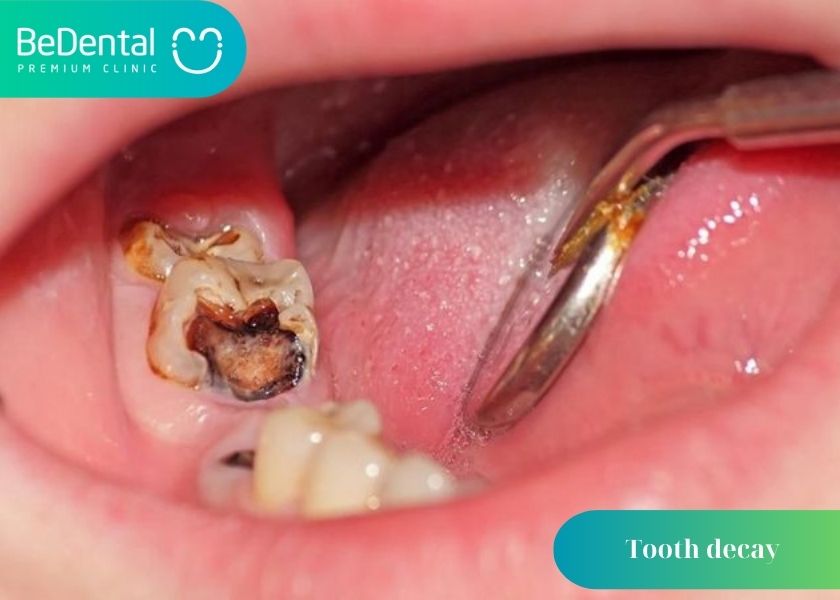
Even though tooth decay has been treated, it can still recur. Therefore, you should not be subjective but take preventive measures to best protect your oral health.
Some effective measures to prevent tooth decay on the inside and outside of teeth are:
- Keep your oral hygiene clean, at least brush your teeth 2-3 times a day.
- Combine flossing and rinsing your mouth regularly.
- Periodically remove dental plaque 1-2 times a year to prevent tooth decay and other dental diseases.
- Limit the menu of foods and drinks high in sugar.
- You should drink plenty of water to stabilize the amount of saliva in the oral cavity.
- Supplement adequate nutrients to improve oral health.
- Use toothpaste containing fluoride to improve the hardness of tooth enamel.
- Eat and rest scientifically to improve the body’s resistance.
- Regular dental check-ups 1-2 times a year to have the most timely treatment plan.
See more: Toothache pain relievers and some useful tips – Be Dental
Tooth decay on the inside and outside can be completely controlled and treated thoroughly if there is a suitable treatment plan. BeDental is proud to be the leading reputable dental address for treating internal and external tooth decay effectively, safely, and economically. Contact us if you need assistance.
BEDENTAL - TOP STANDARD DENTISTRY SYSTEM
In HANOI
Address 1: 7B Thi Sach St, Ngo Thi Nham, Hai Ba Trung Dist, Ha Noi. - 0934.61.9090
Address 2: No 129 Hoang Ngan, Yen Hoa, Cau Giay Dist, Ha Noi. - 0934.61.9090
In HO CHI MINH
Address 1: 53 -55 -57 Pho Duc Chinh St, Nguyen Thai Binh, Dist. 1, Ho Chi Minh. - 0766.00.8080
Working: 9am - 8pm everyday
Website: https://bedental.vn/en/




